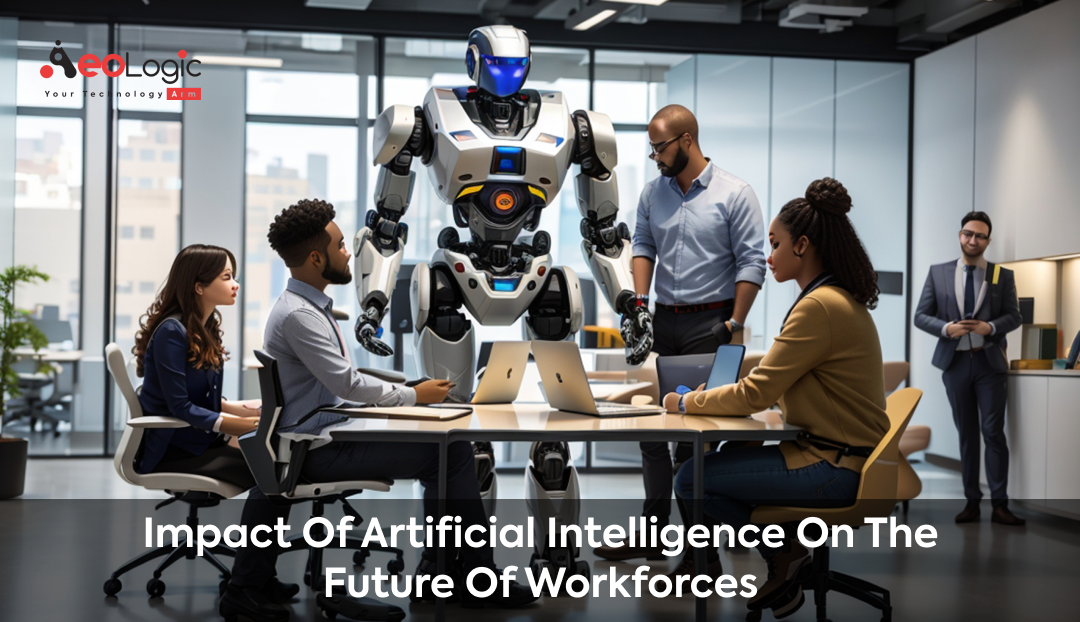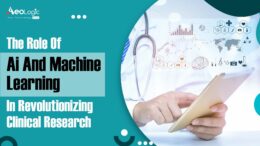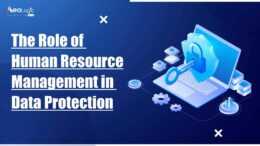AI (Artificial Intelligence) is an influential technology that is changing nearly every part of our lifestyles, and this includes how we do our jobs. In this article, we’ll explore the impact of artificial intelligence in workforces. This is a complex topic that we shall break down into simplified terms making it easy for you to understand how AI is changing the job landscape and what this means in the future.
What is Artificial Intelligence?
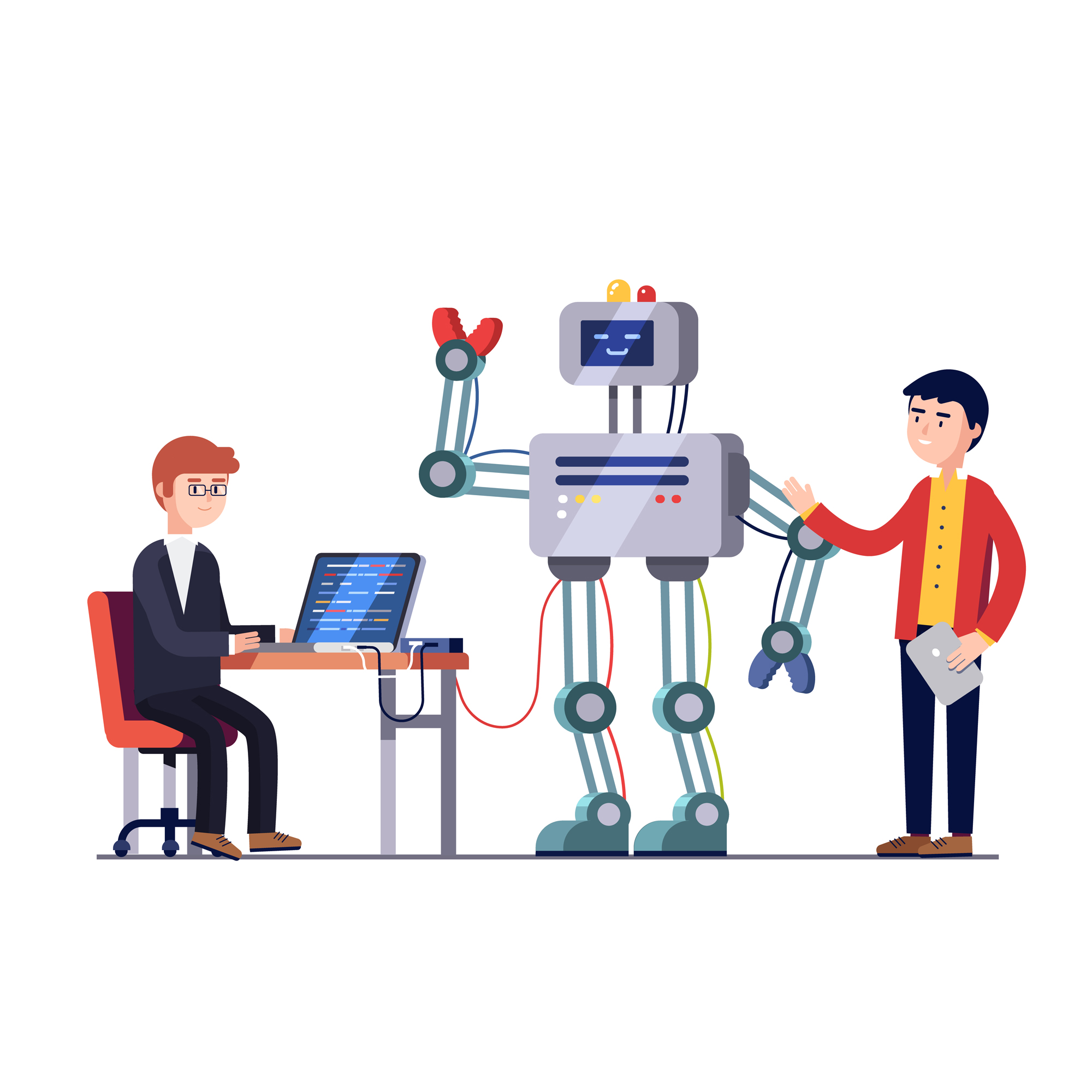
To start on the effect of the impact of artificial intelligence in workforces, let us first know what is Artificial Intelligence. It refers to computer systems for performing tasks that usually demand human intelligence. These encompass problem-solving, learning from experience, identifying patterns and making choices.
The spectrum of AI systems varies from simple rule-based programs to complicated machine learning algorithms. It can analyze a lot of information, provide predictions, and interact with human beings through natural language processing. These applications of AI are realized in different industries including healthcare, and finance not to mention the world of work.
We Also Offer: Traceability Solutions for Supply Chains
Automation and Job Disruption
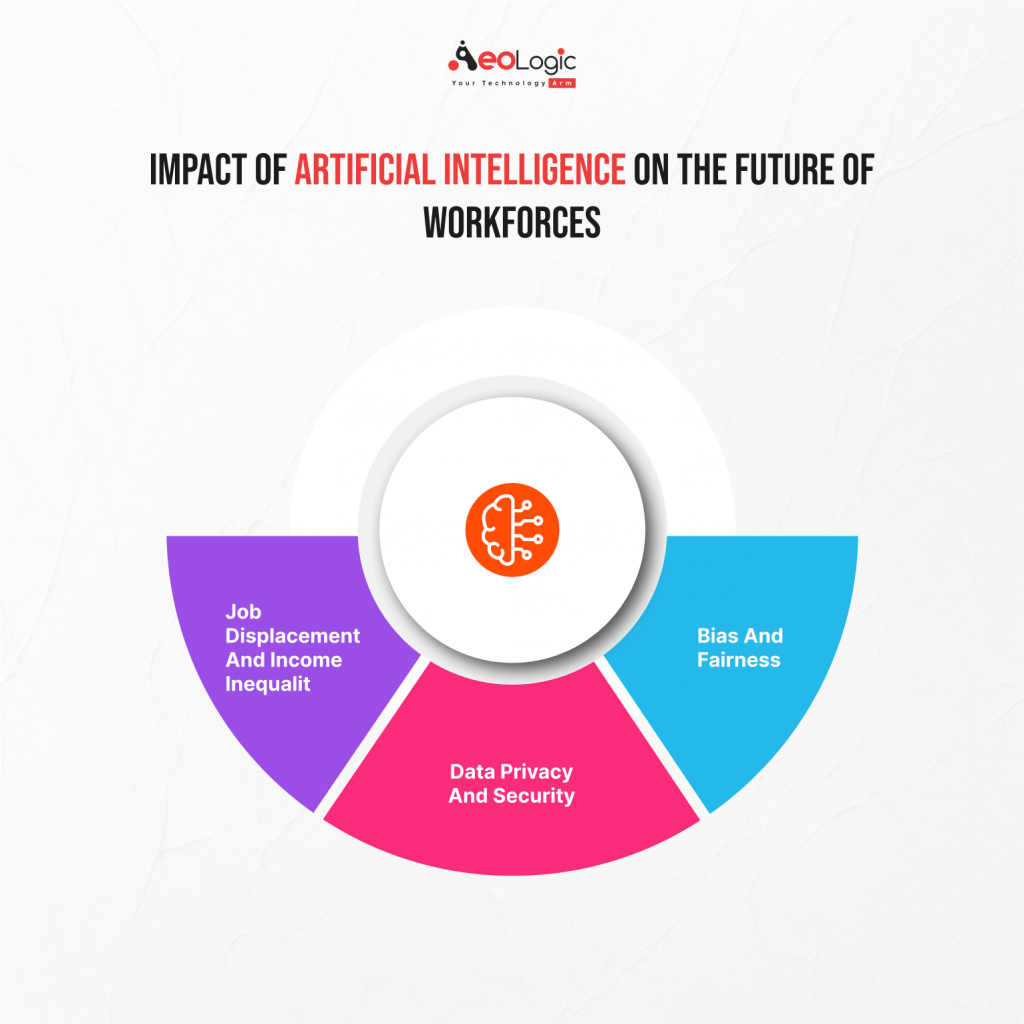
Automation is one of the most profound results of Artificial Intelligence in workforces. Automation deals with AI-based machines and software that perform tasks that were initially accomplished by human beings. On the one hand, automation can improve efficiency and output but on the other hand, it is associated with fear of job loss.
Job Displacement: Who’s at Risk?
Jobs that demand repetitive jobs and routines are potentially threatened by Artificial Intelligence. Automation is a big threat to jobs such as manufacturing, data entry, and customer service. However, the caveat is that some jobs are more vulnerable than others. Occupations such as healthcare professionals, designers, and researchers are highly specialized professions with a high degree of creativity and an automation rate close to 0%.
Also Read: How AI-Powered Automation Can Enhance Business Growth
Upskilling and Reskilling
Workers must welcome more learning in their lifespan as they shift to a dynamic job market. In a nutshell, upskilling has to do with the acquisition of new skills that can be added to one’s present job while reskilling is all about learning a completely different set of skills for use in a different line of business. Through continuous learning, an individual can stay relevant in the labour and take up newer opportunities created by AI.
Enhanced Productivity and Efficiency
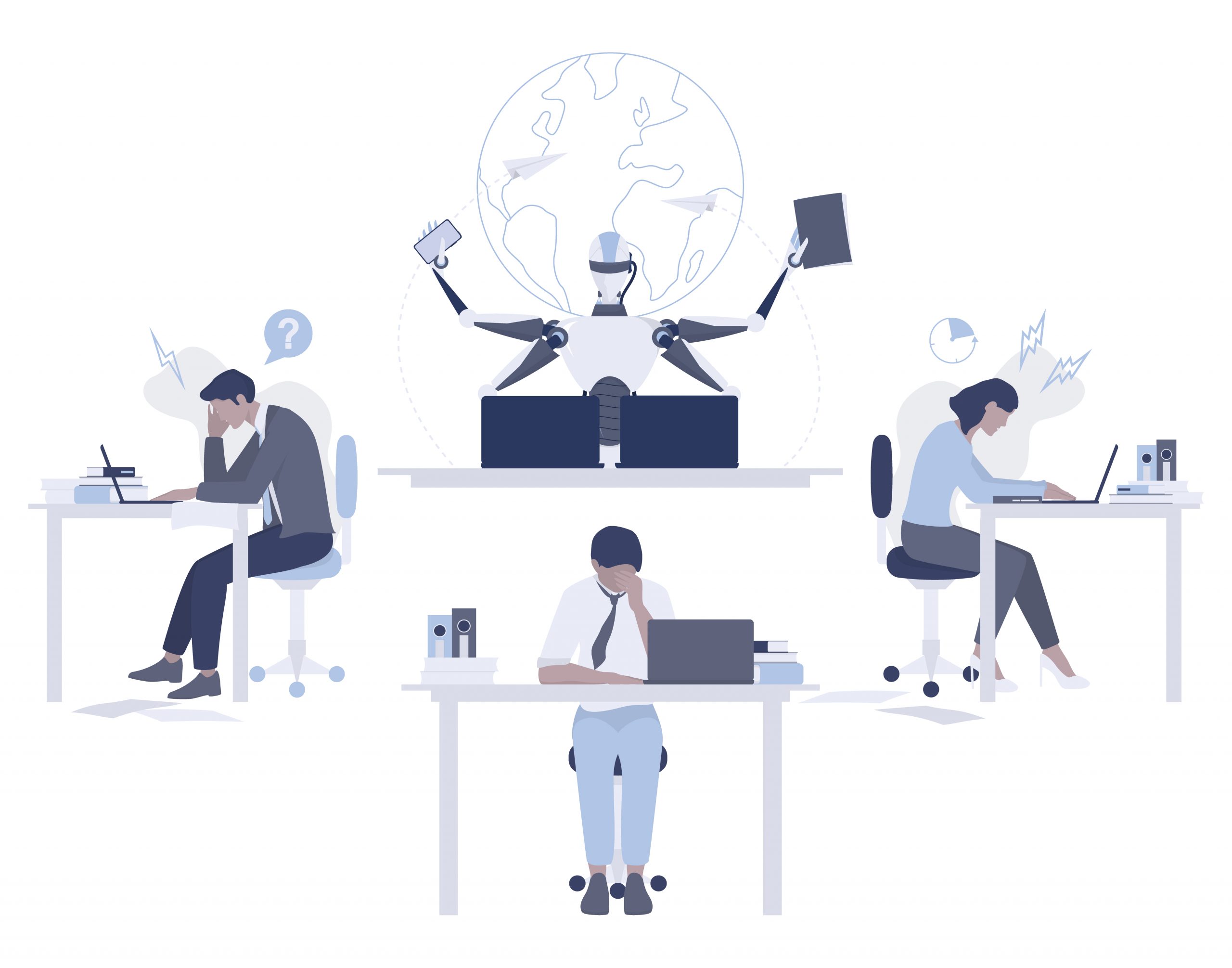
AI is expected to displace jobs in some areas although it provides enormous productivity and efficiency benefits.
Repetitive Tasks Are History
Another important area where AI can play a role is taking up repetitive and mundane work such as data feeding at a higher speed and accuracy and leaving the human workers to concentrate on meaningful, more creative aspects of their jobs. For instance, in a manufacturing factory robots can be used for doing assembly line works thus human workers will be supervising, troubleshooting, and inventing.
Data Analysis and Decision-Making
Artificial Intelligence can ingest large-scale data sets in seconds and reveal insights that would take a human being weeks or even months to learn. This ability is especially useful in sectors such as finance, where AI algorithms can better identify investment opportunities and risks compared to human analysts.
Also Read: The Role of Artificial Intelligence in IT Operations
Personalization and Customer Service
It is inarguable that Artificial Intelligence has transformed the way businesses relate to their customers.
Chatbots and Virtual Assistants: When visiting websites or calling customer support, you have probably met chatbots or virtual assistants. This AI-driven software can offer instant replies to customers’ queries thus enhancing customer care and shortening response time.
Personalized Recommendations: If you have ever wondered at the accuracy with which online merchants such as Amazon recommend products for you. That’s AI in action. For example, through Artificial Intelligence, your past purchases and browsing are analyzed, and such intelligence suggests products that a customer may be interested in, consequently improving their shopping experience.
The Role of AI in Creativity and Innovation
As much as AI is good in automating and data analysis, it can also inspire creativity and innovation.
Design and Creativity: Designers can use AI-powered tools for the generation of fresh ideas, recommendations on the auxiliary work, and just visual art. Such human and AI collaboration can support the creation of new solutions in multiple creative areas.
Research and Development: AI shortens the experimentation and discovery phase in research and development. AI algorithms can support scientists and researchers in analyzing huge data sets and drawing patterns that can lead to breakthroughs in disciplines including medicine, materials science, etc.
Also Read: How AI is Helping Business Get Off the Ground
Challenges and Ethical Considerations
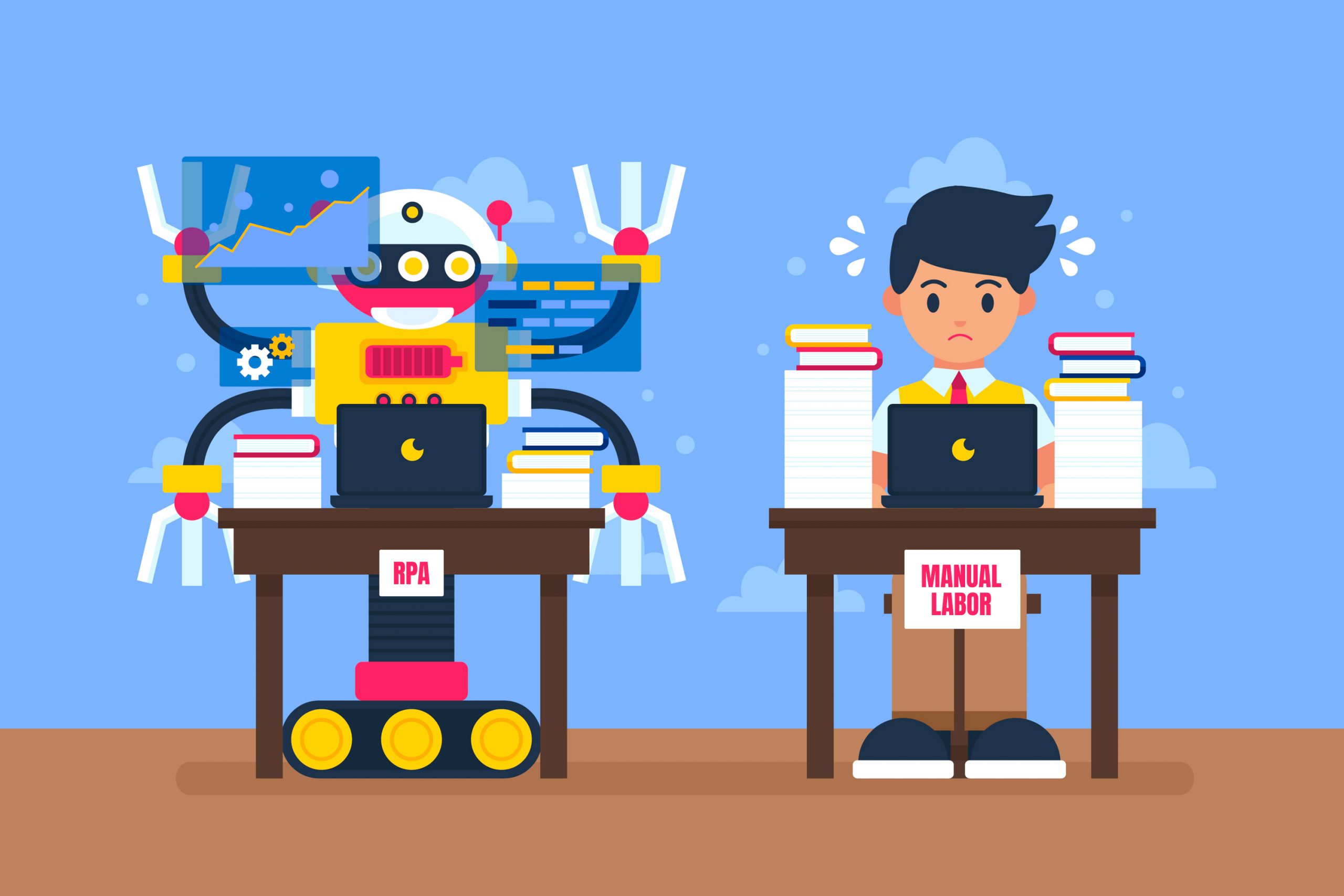
Artificial Intelligence is also accompanied by various challenges and ethical issues as it continues shaping the workforce of the future.
Job Displacement and Income Inequality: AI being adopted in many organizations’ daily operations may displace jobs for some workers and increase income inequality. Society should tackle these hurdles by assisting displaced employees and ensuring fairness in accessing AI-based opportunities.
Data Privacy and Security: In the face of AI’s capacity to collect and analyze massive data, the issue of privacy and data protection has become more significant. Therefore, organizations need to have extensive data protection structures while observing ethical use of the same.
Bias and Fairness: Biases in the data that help to train AI systems can be inherited by the systems. This can result in possible unfairness as well as discrimination in hiring and lending. Developing fair and unbiased AI algorithms can be a great way to ensure diversity in the workforce.
Final Words
Artificial Intelligence is fundamentally transforming the future of workforces. Although the technology only streamlines some tasks and alters the type of work in most cases, it also provides room for better productivity, customization, as well as innovation. For one to succeed in this forthcoming AI-dependent future, he/she/has to facilitate upskilling and reskilling, deal with the ethical issues related to AI technology, and the benefits of AI should spread throughout.
Future work will be successful through cooperation of the humans and AI. Yet leveraging AI to extend the power of human thought and to allow an already augmented workforce to perform even better. This is the direction in which the role of Artificial Intelligence in workforces will continue evolving as we traverse this transformative era that has its challenges and potential.


